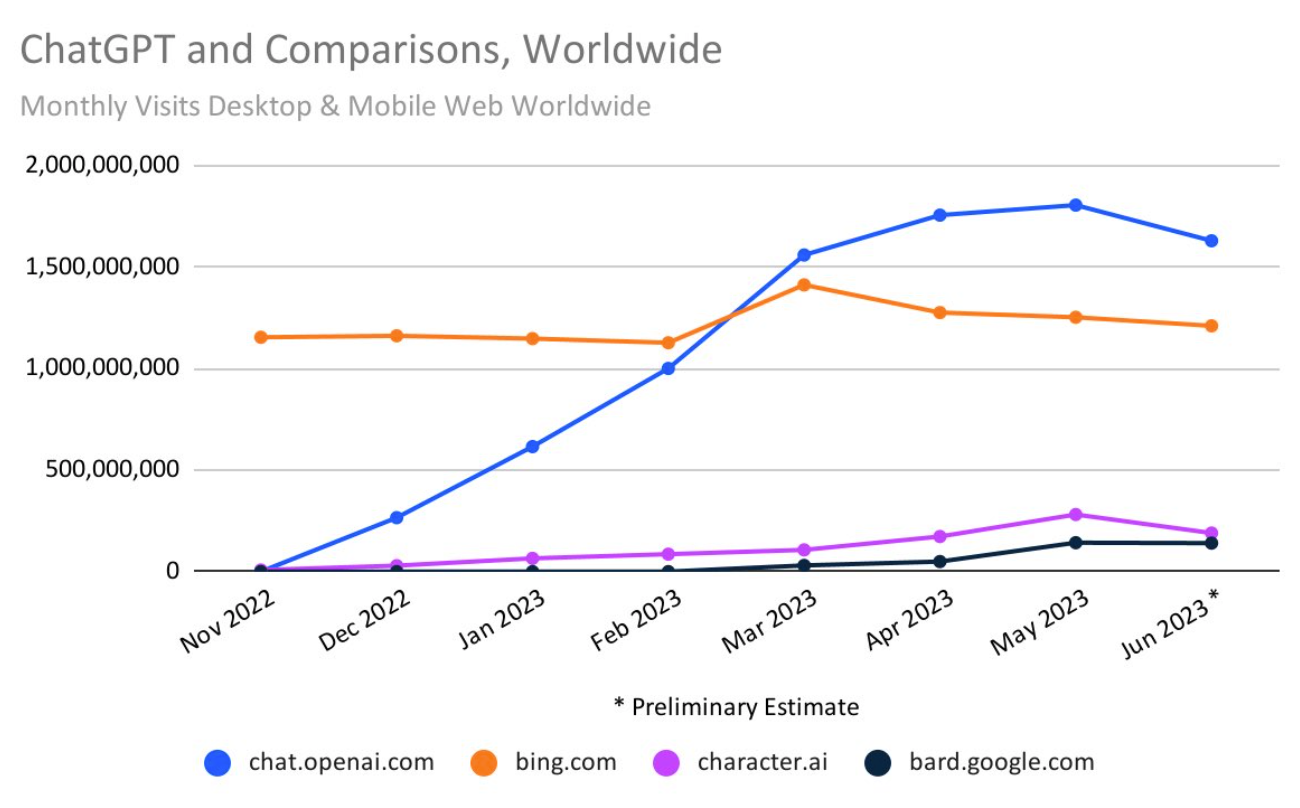Cage Match: Twitter vs. Threads, PeakGPT, Local News Survival

Cage Match: Twitter vs. Threads
By now you've read about or signed up for Threads, Meta's Twitter clone. Threads officially launched yesterday in 100 countries, though not Europe. Within 24 hours there were more than 30 million people on the app (now 70 million) – partly because it draws on Instagram's installed base of over 1 billion users (estimates vary). Twitter, by comparison has roughly 350 million users (estimates vary). This is the true Mark Zuckerberg - Elon Musk cage match: Twitter vs. Threads. Musk is threatening to sue Meta for "systematic, willful, and unlawful misappropriation of Twitter’s trade secrets and other intellectual property." Indeed, Meta has a history of copying other companies' products, but Musk's threat is clearly a reflection of the fact he's flustered by the rapid adoption of Threads. And advertisers, who continue to have brand safety concerns with Twitter, are paying attention. In fact, Instagram head Adam Mosseri said the reason Threads exists is because Musk has blown it with "volatility" and "unpredictability." Indeed, he has.

Our take:
- One issue with Threads, by design, is that you can't delete your account without also deleting Instagram – though you can deactivate it.
- There are now perhaps 7 or 8 Twitter alternatives, but it's really Twitter vs. Threads vs. Bluesky, which just raised $8M. Other clones/competitors may survive by "verticalizing" around specific communities (e.g., Spill).
- Twitter won't die, at least not immediately, but it will continue to decline both in terms of usage and ad revenue.
Has ChatGPT Peaked?
ChatGPT reportedly reached 100 million users within two months of its November 2022 unveiling – incredibly accelerated. Now, however, it appears that traffic has plateaued and even declined according to data from SimilarWeb. Let's be cautious; this is just one data point. But what it suggests is that the novelty of ChatGPT as a search alternative may be wearing off. Separately, Sensor Tower data show that app downloads for ChatGPT and Bing have slowed. According to a report on CNBC, "ChatGPT downloads on iPhones in the U.S. were down 38% month over month in June ... [so were] Bing app downloads." Meanwhile, Google's search share is up and Bing's is down. Google was initially caught off guard by ChatGPT's popularity and its Bing integration. The company then scrambled to respond (Bard, Google SGE). To a degree those beta rollouts were "AI search theater" (mainly for investors). But they may have been enough to stall ChatGPT and Bing's AI momentum.

Our take:
- The consumer slowdown has not impacted AI SaaS integration and B2B adoption; so no deceleration there.
- Google wouldn't have introduced Bard or SGE if investors hadn't forced their hand. SGE in particular is a "defensive product."
- The SERP is broken. Some sort of new search UX wants to come into being. But as the data show consumer habits are entrenched.
Local News on Life Support
Fat and happy with print ad revenue, the newspaper industry wasted years before taking digital seriously. By the time that eventually happened, they didn't have the resources or expertise to compete with the digital giants, which had all the scale and ad revenue. In the interim, private equity got involved to the detriment of all, especially local news coverage. Now publishers are effectively vassals of Google and Facebook. Both companies have supported local publishers but neither is entirely sincere about it. They do it for mostly self-interested reasons: content, feelgood PR and lobbying against legislation. In a kind of desperation move, governments around the world have sought to "tax" Google and Facebook to support local news. But those efforts have been aggressively resisted. Various models are being tried to sustain local coverage, though local news deserts are growing. Now there's a coordinated, ambitious "last ditch effort" among foundations to save local news with a reported $500 million in funding. But that by itself isn't going to be enough.

Our take:
- Local news is critical to a functioning democracy. Communities with strong local news orgs. are less polarized.
- More people are getting news now from social media, which is full of misinformation and will get worse before 2024.
- Unfortunately, $500M won't fix the problems of local news. Multiple factors are to blame and multiple solutions are needed.
Recent Analysis
Short Takes
- Take BrightLocal’s Local Search Industry Survey.
- Bard offers at least some incorrect local results 80% of the time.
- OpenAI takes GPT4 to general availability.
- Google tests author bylines in Top Stories carousel.
- Google wants a robots.txt for AI models.
- Google changes privacy terms to ingest all "public" data for AI training.
- NYC's new law on use of AI in hiring goes into effect.
- Error-filled, AI-generated Star Wars article embarrasses Gizmodo.
- Elon Musk is speedrunning the "enshittification learning curve."
- Defense bill would block agencies from buying our personal data.
- Lobbyists: FTC's "click to cancel" rule would confuse users (WSJ).
- How Congress failed its opportunity to rein it big tech (WaPo).
Listen to our latest podcast.

How can we make this better? Email us with suggestions and recommendations.

